Sustainable innovation earns Western students a share of $19,000
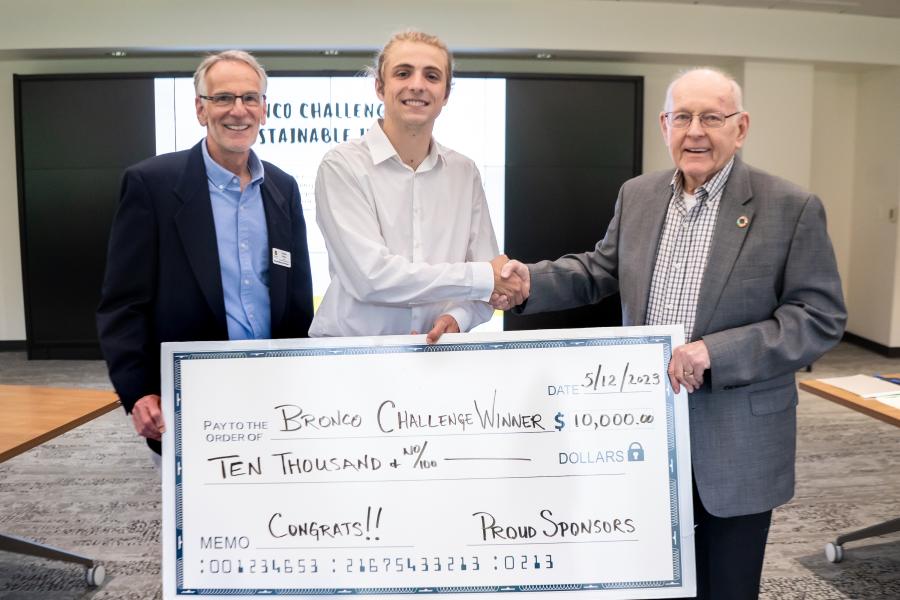
Seed, the winning Bronco Challenge for Sustainable Impact team, earned a $10,000 prize. Team member Joshua VanSlambrouck, center, accepted the award on behalf of his team. He is pictured with Dr. Timothy Palmer, left, professor of management and director of the Center for Sustainable Business Practices, and Dr. Neil Drobny, Bronco Challenge program director.
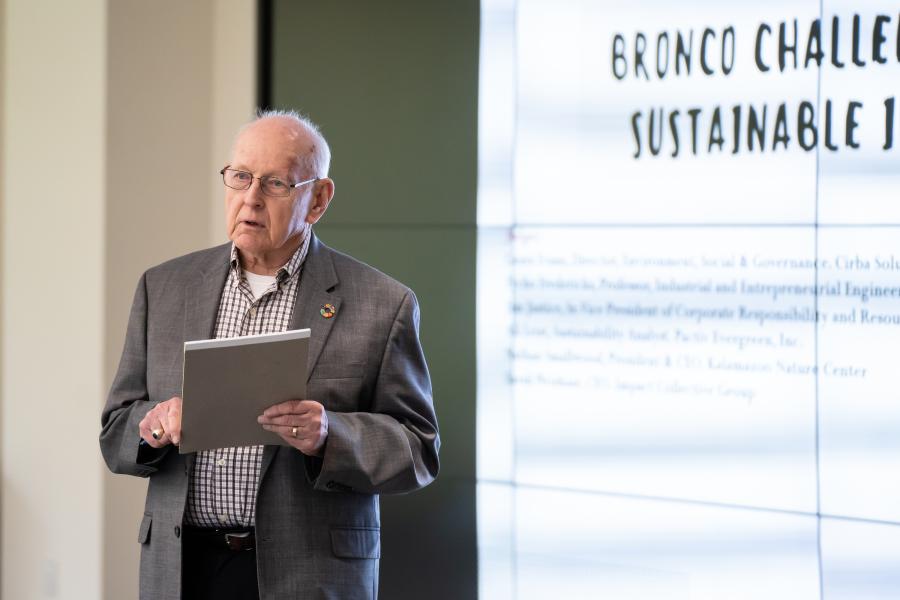
Dr. Neil Drobny lays out the challenge to the judges and audience in the dean's conference room at the Haworth College of Business.
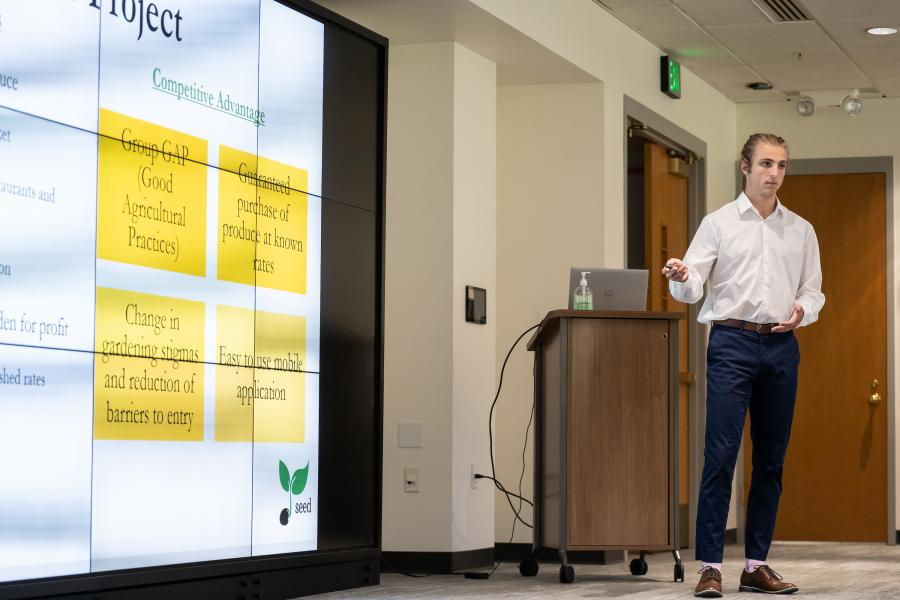
Joshua VanSlambrouck gave the presentation for the Seed urban gardening team.
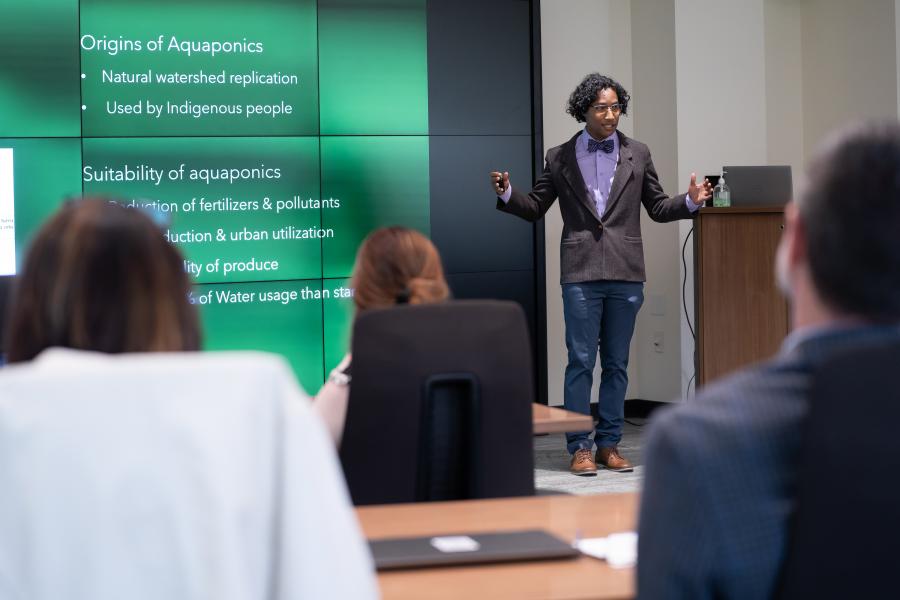
Keeton Bigham-Tsai presents his team's aquaponics concept to the judges.
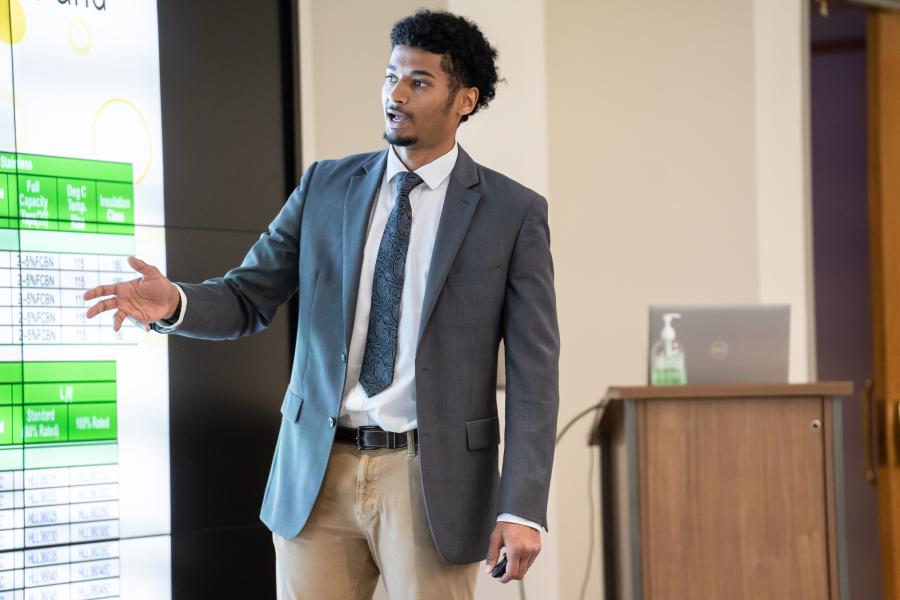
Jordan Walker explains calculations he and team members made for an off grid stadium lighting system.
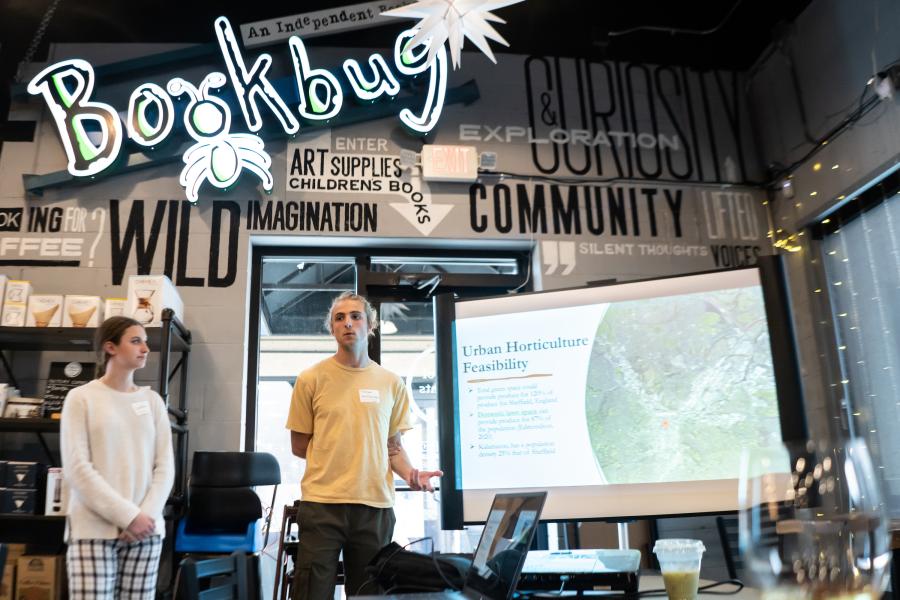
The winning team was invited to present its concept to community members during a Green Drinks gathering at This is a Bookstore in Kalamazoo.
UPDATE Aug. 18, 2023—Support for the second Bronco Challenge for Sustainable Impact is ramping up. New in fall 2023, students can register early for the challenge to be included in weekly email updates and get help finding a team to join. Registration is open until Nov. 10, when challenge proposals must be submitted. Sponsors for the 2023 Bronco Challenge, who have the option this year to suggest some project ideas, include Kalsec, Greif, GreenLink Engineering, Meijer, Owens Corning, Pfizer, WMU Haworth College of Business and the WMU Office for Sustainability. Anyone interested in registering for the challenge or becoming a sponsor should contact Dr. Neil Drobny.
KALAMAZOO, Mich.—A challenge to imagine a greener future ended with some extra green for several Western Â鶹´«Ă˝Ó¦ÓĂ University students. The interdisciplinary team of Broncos behind Seed, an urban gardening project, won first place and a $10,000 prize in the inaugural Bronco Challenge for Sustainable Impact.
"I have been shepherding student projects for many years, and this year’s inaugural crop of projects in the Bronco Challenge are among the best I have seen," says Dr. Neil Drobny, program director and affiliate professor in Haworth College of Business' Center for Sustainable Business Practices. "As we moved through the presentations, I thought to myself, 'Wow, the work being reported is so outstanding, the judges are going to have a difficult time sorting these projects into first, second and third place winners.'”
"Because of its nature, this challenge allowed me to evaluate my strengths from an entirely new angle," adds business student Will Roosien, a member of the Seed team. "What started as a side project has now surprisingly and significantly changed the trajectory of my life and the manner by which I view myself."
Other top winners included the teams behind Aquaponics in Education, a sustainability hub for colleges that earned the $6,000 second place prize, and Off Grid Stadium Lighting, a system of solar-powered lights for Western's soccer stadium that earned the $3,000 third place prize.
"This is truly inspirational," Jim Justice, senior vice president of corporate responsibility and resource management at Kalsec, Inc. told participants after their final presentations. He was among a group of industry professionals charged with judging the projects. "You are the future of what's going to happen for us, our kids and our grandkids. I appreciate the innovation and time you all put into this."
The challenge, which launched in fall 2022, encourages students to reach across academic disciplines to form teams and solve challenges related to one or more of the Sustainable Development Goals established by the United Nations.
"The process of diving into the local, national and international governances that surround the climate movement and other social justice movements was entirely enlightening for me," Roosien says.
Funding for prizes was provided by the University and sponsors Cirba Solutions, Greenlink Engineering, Invenergy, Kalsec and Owens Corning.
"We're all here because our companies have recognized the importance of sustainability. So seeing what the next generation is going to bring to the table and being a part of helping shape that was a tremendous opportunity," says Laura Evans, director of environment, social and governance for Cirba Solutions.
"With such a complex supply chain, (Kalsec is) always looking for novel solutions to solve big sustainability problems that affect our business," Justice adds. "Programs like the Bronco Challenge are one way we can support and encourage sustainable innovation and help find new solutions to big problems."
THE PROJECTS
: Team members Alexa Hempel, Lexus Lawlor, Will Roosien and Joshua VanSlambrouck
Focused on closing equity gaps, this project aims to improve nutrition, food security and community involvement through urban gardening. The team's vision has roots in existing urban gardening movements and builds on them by not only providing participants with the tools to start their own garden but also creating an app to provide educational resources, a community forum, opportunities for garden sponsorship and an avenue for assistance in produce sales and logistics.
: Team members Keeton Bigham-Tsai, Keila Howard and Addi Sorensen
To accommodate higher demand for sustainability education, this project creates a curriculum around aquaponics. The group would create an agricultural and hydroponic ecosystem that could be placed in high-traffic areas to get college students engaged in sustainable thinking, offering subscriptions to universities to use the technology and maintain the ecosystems, furthering their delivery of sustainability education.
: Team members Rachel LaHaie, Princeton Johnson and Jordan Walker
Currently, Western's soccer teams can only schedule daytime games because their stadium does not have lights. This project designs a potential solar-powered lighting layout, power distribution plan and control matrix to power a new system of stadium lights that is sustainable and allows for more opportunities for community involvement in games and other events after normal business hours.
A 'LIFE-CHANGING' EXPERIENCE
Because the Bronco Challenge is not part of a course, students had to find time outside of classes and other commitments to collaborate, develop their ideas and earn resume-worthy experience. An overall passion for sustainability fueled many of the students to pursue their project goals, and in some cases, it led to transformative results.
"My biggest takeaway is that there is a large group of people that are as passionate about sustainability as I am, and there are many ways that we can make a difference," says Jordan Walker, a member of the stadium lighting team who recently graduated with a bachelor's degree in electrical engineering. "Although I did not win the challenge, I was inspired by the other projects and the people I met while competing."
"The Bronco Challenge for Sustainable Impact enabled me to identify a place in the professional world by which I can flourish," adds Roosien, who was inspired to change his major from marketing to regulatory law. "As a direct result of this challenge, I reevaluated my career path and gained a new understanding of the sort of professional I aspire to be."
The challenge intentionally asked students to work with peers in different fields of study in order to encourage varying perspectives and build teamwork. It also allowed teams to network and connect with mentors both on campus and in the community to give them industry perspective and think about the potential impact of their work.
"This project, I feel, developed our whole team in total—made us better writers (and) better communicators," adds Seed team member Joshua VanSlambrouck, another recent graduate with a bachelor's degree in chemical engineering.
While bringing the ideas behind the projects to fruition was not part of the challenge, all of the teams are interested in pursuing their innovations further. Walker's team has talked extensively with staff in both athletics and facilities management and feels its plan is feasible if budgeting allowed for it. Keeton Bigham-Tsai, whose team focused on aquaponics, secured a Student Sustainability Grant from Western's Office for Sustainability for additional funding to create a pilot aquaponics system on campus. He hopes to begin building it soon. VanSlambrouck is also interested in exploring how his team's urban gardening concept could blossom in the future.
“The community can benefit from this challenge through the projection of creative ideas and solutions that affect the people and environment of Kalamazoo,” he says.
"This project has impacted my life professionally by showing me that I have a passion for pursuing more sustainable ways of working and living," Walker adds. "It is my goal to stay involved in the community and to continue to find more ways to have a positive impact."
For more WMU news, arts and events, visit WMU News online.


